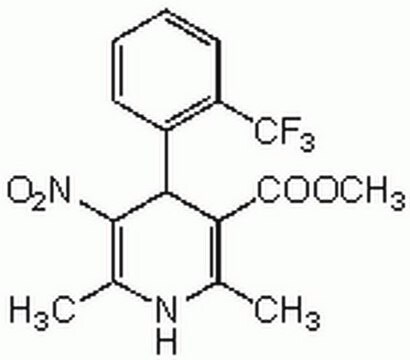B133
(S)-(−)-Bay K8644
≥98% (HPLC), solid
Synonym(s):
S-(−)-1,4-Dihydro-2,6-dimethyl-5-nitro-4-[2-(trifluoromethyl)phenyl]-3-pyridinecarboxylic acid methyl ester
About This Item
Recommended Products
Quality Level
Assay
≥98% (HPLC)
form
solid
color
yellow
solubility
H2O: slightly soluble
ethanol: soluble (Organic solutions are stable for at least 20 days at RT.)
storage temp.
2-8°C
SMILES string
COC(=O)C1=C(C)NC(C)=C([C@H]1c2ccccc2C(F)(F)F)[N+]([O-])=O
InChI
1S/C16H15F3N2O4/c1-8-12(15(22)25-3)13(14(21(23)24)9(2)20-8)10-6-4-5-7-11(10)16(17,18)19/h4-7,13,20H,1-3H3/t13-/m0/s1
InChI key
ZFLWDHHVRRZMEI-ZDUSSCGKSA-N
Gene Information
human ... ADORA3(140)
rat ... Adora1(29290) , Adora2a(25369)
Looking for similar products? Visit Product Comparison Guide
General description
Application
Biochem/physiol Actions
Features and Benefits
Legal Information
Signal Word
Warning
Hazard Statements
Precautionary Statements
Hazard Classifications
Eye Irrit. 2 - Skin Irrit. 2
Storage Class Code
11 - Combustible Solids
WGK
WGK 3
Flash Point(F)
Not applicable
Flash Point(C)
Not applicable
Personal Protective Equipment
Certificates of Analysis (COA)
Search for Certificates of Analysis (COA) by entering the products Lot/Batch Number. Lot and Batch Numbers can be found on a product’s label following the words ‘Lot’ or ‘Batch’.
Already Own This Product?
Find documentation for the products that you have recently purchased in the Document Library.
Our team of scientists has experience in all areas of research including Life Science, Material Science, Chemical Synthesis, Chromatography, Analytical and many others.
Contact Technical Service









